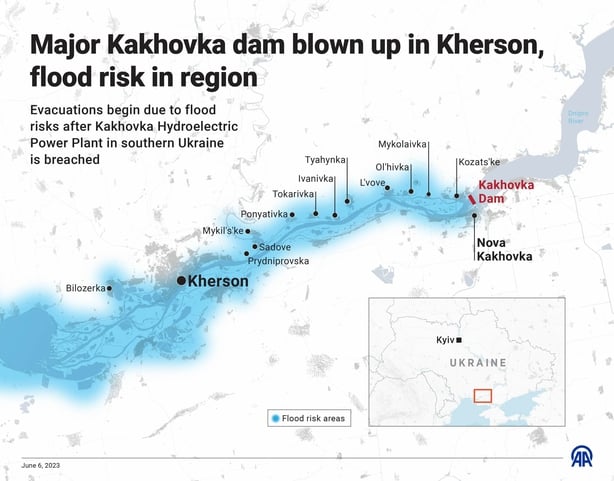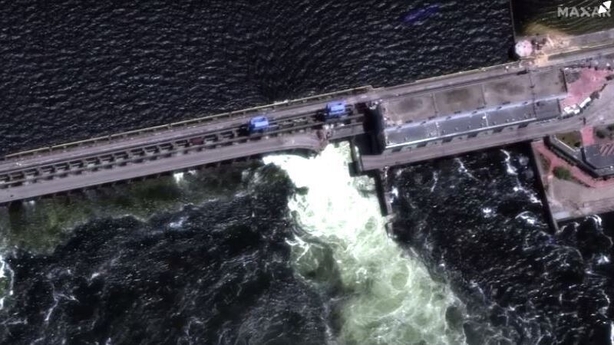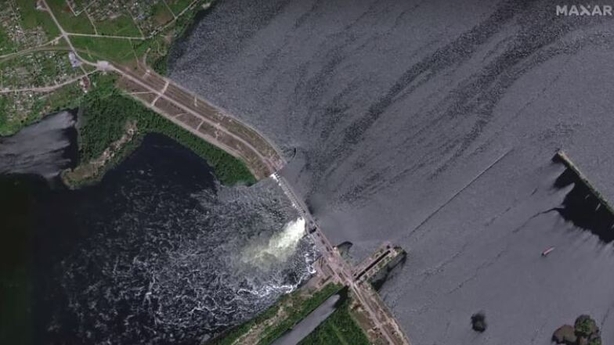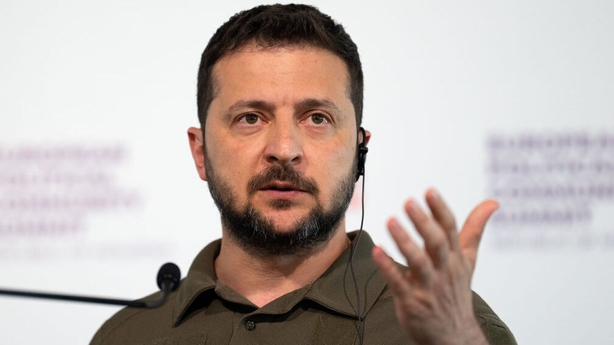A torrent of water burst through a massive dam on the Dnipro River that separates Russian and Ukrainian forces in southern Ukraine today, flooding a swathe of the war zone and forcing villagers to flee.
Ukraine accused Russia of blowing up the Nova Kakhovka dam in a deliberate war crime.
The Kremlin said it was Ukraine that had sabotaged the dam, to distract attention from the launch of a major counter-offensive Moscow says is faltering.
Some Russian-installed officials said the dam had burst on its own.
Neither side offered immediate public evidence of who was to blame. The Geneva Conventions explicitly ban targeting dams in war, because of the danger to civilians.
By mid-morning in the city of Kherson in Ukrainian government-controlled territory downstream from the dam, a pier on a tributary of the Dnipro had already been submerged.

Ukrainian police released video of an officer carrying an elderly woman to safety and others rescuing dogs in villages being evacuated as the waters rose.
It was not immediately clear if anyone had been killed. The US administration said it could not say conclusively what caused the destruction of the dam, but White House spokesman John Kirby said it had probably caused "many deaths".
Interior Minister Ihor Klymenko accused Russia of shelling areas from where people were being evacuated and said two police officers were wounded.
On the Russian-controlled bank of the Dnipro, the Moscow-installed mayor of Nova Kakhovka said water levels had risen to 11 metres (36 feet).
Residents reached by telephone there said that some had decided to stay despite being ordered out by occupying Russians.
The Kazkova Dibrova zoo on the Russian-held riverbank was completely flooded and all 300 animals were dead, a representative said via the zoo's Facebook account.
The dam supplies water to a wide area of southern Ukrainian farmland, including the Russian-occupied Crimean peninsula, as well as cooling the Russian-held Zaporizhzhia nuclear plant.

The vast reservoir behind the dam is one of the main geographic features of southern Ukraine, 240km (150 miles) long and up to 23km (14 miles) wide.
An expanse of countryside lies in the flood plain below, with low-lying villages on the Russian-held southern bank particularly vulnerable.
The dam's destruction raised fears of a new humanitarian disaster in the centre of the war zone and transformed frontlines just as Ukraine prepared to launch a long-awaited counter-offensive to drive Russian troops from its territory.
Russia has controlled the dam since early in its 15-month-old invasion, although Ukrainian forces recaptured the Dnipro's northern bank last year. Both sides had long accused the other of plotting to destroy the dam.

"Russian terrorists. The destruction of the Kakhovka hydroelectric power plant dam only confirms for the whole world that they must be expelled from every corner of Ukrainian land," President Volodymyr Zelensky wrote on the Telegram messaging app.
Russians had "carried out an internal detonation of the structures" of the dam, Mr Zelensky said. "About 80 settlements are in the zone of flooding."
The canal was blocked by Ukraine after Russia's 2014 annexation of Crimea, something which led to acute water shortages on the peninsula that ended only after Russian forces seized the canal when they invaded on 24 February last year.
Russian officials cited restoring access to it as one of the advantages of what Moscow calls its "special military operation" in Ukraine.
We need your consent to load this rte-player contentWe use rte-player to manage extra content that can set cookies on your device and collect data about your activity. Please review their details and accept them to load the content.Manage Preferences
NATO Secretary-General Jens Stoltenberg called the destruction "an outrageous act, which demonstrates once again the brutality of Russia's war in Ukraine".
UN Secretary-General Antonio Guterres said the United Nations had no independent information on how the dam was breached, describing it as "another devastating consequence" of Russia's invasion.
Kremlin spokesman Dmitry Peskov blamed "deliberate sabotage by the Ukrainian side".
"Apparently, this sabotage is also connected with the fact that having started large-scale offensive actions two days ago, now the Ukrainian armed forces are not achieving their goals."
Earlier, Russian-installed officials had given conflicting accounts, some saying the dam had been hit by Ukrainian missiles overnight, others saying it had burst on its own due to earlier damage.
The UN nuclear watchdog said the Zaporizhzhia power plant, upriver on the reservoir's Russian-held bank, should have enough water to cool its reactors for "some months" from a separate pond, even as the huge reservoir drains out.
Video showed water surging through the remains of the dam, which is 30 metres tall and 3.2km long.
Some 22,000 people living across 14 settlements in the Kherson region are at risk of flooding, Russia's RIA news agency quoted the Moscow-installed head of the region as saying.

The Russian-installed governor of Crimea, Sergei Aksyonov, said there was a risk that water levels in the canal that carries fresh water to the Black Sea peninsula could fall.
Crimea, which Russia has held since 2014, had sufficient water reserves for now and the risk would become clear in coming days.
Mr Zelensky said in an interview published on Saturday that Ukraine was poised to unleash its much-heralded major counter-offensive, using newly supplied Western battle tanks and armoured vehicles.
Moscow said the Ukrainian offensive began on Sunday and claimed to have repulsed a third day of Ukrainian advances.
Kyiv has maintained deliberate ambiguity about it though Mr Zelensky hinted at successes. In an evening address before the dam broke, he hailed "the news we have been waiting for" claiming forward moves around Bakhmut, a ruined city Russia captured earlier this month.
Russia also carried out a fresh wave of overnight airstrikes on Kyiv. Ukraine said its air defence systems had downed more than 20 cruise missiles on their approach to the capital.
The Shebekino district of Russia's Belgorod region near the Ukrainian border came under renewed shelling, local authorities said. Anti-government Russian fighters based in Ukraine claim to have captured villages there.
